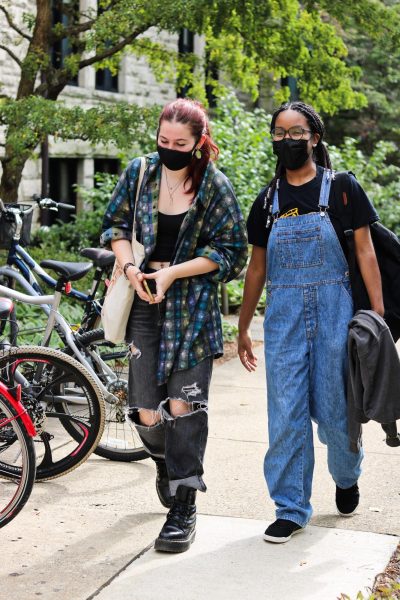Post-Grad Careers Jeopardized by Three-Semester Plan
When COVID-19 first sent students scrambling back home in March of 2020, I was devastated. Although it had taken me a while to feel at home in Oberlin, by my second year I’d come to love the College. There wasn’t anywhere else I’d rather be. Now, as a fourth-year, that feeling seems beyond foreign. I envy the students in my year who managed to graduate early. Much of this sentiment can be attributed directly to the College’s poor decision-making. In choosing to implement a three-semester plan, the College took advantage of third- years, placing them under undue strain and, most egregiously, harming their ability to prepare for a career after graduation.
In the summer of 2020, Oberlin College found itself in the unenviable position of planning an academic year during a pandemic. They knew, presumably, that decisiveness was required. And so, through a rapid and unclear process, a decision was made to move to a three-semester plan. Crucial to this plan was staggering when students were on campus. Both second- and third-years would essentially be required to go to summer school. Yet only third-years would have a spring semester followed immediately by a summer semester — and then start their final year a month later.
The only logical reason to give third- years the worst schedule is that they are the least likely to transfer to another institution. For the most part, they’re too accustomed to Oberlin to leave on the basis of an unfair academic schedule. If first- and second-years were forced to do two semesters straight, many of them may have chosen to study elsewhere. Fourth-years never had to worry about that possibility; the College couldn’t have asked them to do a summer semester, since many of them had jobs, graduate schools, and other programs starting soon after graduation. And so, third-years were stuck on campus from January through September, sacrificing our most valuable career development opportunities for the College’s bottom line.
I know that for me, and for many students I’ve spoken to, the combination of the spring and summer semesters was too much. Once spring semester ended, I was exhausted. I’d started the semester in January with little energy, drained from over ten months of staying shuttered in my home, separated from my friends. The semester itself was hardly rejuvenating. The gut-punch, however, was starting the summer semester just ten days after finishing finals.
In some ways, summer semester was easier. I dropped some activities, had the chance to live in Village Housing with friends, and enjoyed the temporary rollback of COVID-19 restrictions. Yet the exhaustion never left. Spring semester was like driving too quickly on a bumpy, dangerous road. The drive was stressful, and the wear and tear on the car was immediate. Over summer semester, although the road smoothed out, and I was able to drive a little slower, I was still trundling along in the same beat-up car. The result was a semester of burnout, prolonged illness, and a dwindling ability to complete schoolwork.
This, alone, is frustrating. COVID-19 may have guaranteed that my third year would be subpar, but the College ensured it would be miserable. The most infuriating aspect of this, however, is not the burnout. It is the failure of the College to support us in preparing for a career after Oberlin. Summers are a valuable commodity for a college student; during the summer, we can get jobs to pay for tuition, internships to boost our résumé, or pursue other opportunities such as language intensives and study abroad programs. The summer after our third year is especially important since it’s typically when internships turn into job offers and when we work on fellowship and graduate school applications. Instead, we were tasked with preparing for life after college while inundated with coursework and exhausted by months of studies. None of this is in line with the supposed goal of college — preparing us for a career once we graduate.
The Junior Practicum, the College’s solution to the fall semester we spent at home, provided us with a one-month-long remote paid internship. While this program was largely successful, the Practicum internships were a replacement for opportunities lost to COVID-19 during our second year. They do not make up for the time we could have spent drafting important applications and working in-person this past summer, an opportunity afforded to most college students across the country.
Before COVID-19, a close friend of mine had a study abroad experience and a political internship lined up. These were two essential pieces to the puzzle of their future career, and they’d spent numerous months networking and applying for the programs. Due to COVID-19, both were canceled. Without a summer break, they haven’t been able to fill that gap on their résumé, and their fellowship applications have been thrown into jeopardy. There simply isn’t a substitute for opportunities of that caliber.
When I was preparing this piece, another friend of mine wondered what could be achieved by criticizing the three-semester plan. After all, why should the College ever have to do it again? Yet less than two years ago, we assumed the same thing — that we would always operate on a fall-spring semester schedule. For all we know, administrators may need to consider a similar plan in the future. If they do, I hope that they remember the toll it took on their students, faculty, and staff — and I hope they ask themselves if it was worth it.
It’s also necessary to ask why the College is so out of touch with the reality of student life. How could administrators forget how essential the final college summer is to securing a post-graduate career? Or was that consideration outweighed by the necessity to keep students from transferring? Either way, it’s disheartening to feel that the College is sabotaging the careers of its own students, rather than supporting them as it is supposed to.
Now that classes have started, I will admit that my desire to graduate as soon as possible has diminished. Although campus is overwhelmed by students, and COVID-19 restrictions can’t be rolled back fully, the College feels energized in a way I haven’t felt since before the pandemic. I’m excited to be taking classes, meeting new people, and working late hours in the Review office. I just wish that I wasn’t also scrambling to salvage my post-graduate plans, feeling that my years of hard work may not be enough.




